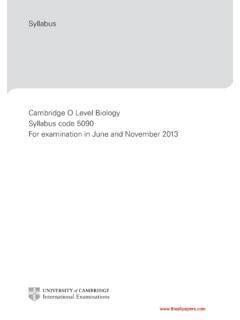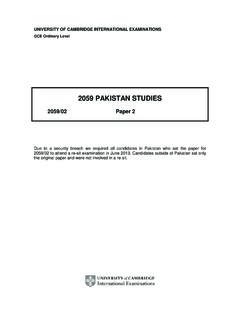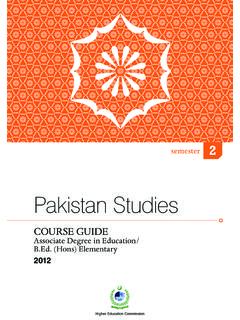Transcription of 2059 PAKISTAN STUDIES - TheAllPapers
1 CAMBRIDGE INTERNATIONAL EXAMINATIONS GCE Ordinary Level MARK SCHEME for the October/November 2012 series 2059 pakistan studies 2059/01 Paper 1 (History and Culture of PAKISTAN ), maximum raw mark 75 This mark scheme is published as an aid to teachers and candidates, to indicate the requirements of the examination. It shows the basis on which Examiners were instructed to award marks. It does not indicate the details of the discussions that took place at an Examiners meeting before marking began, which would have considered the acceptability of alternative answers. Mark schemes should be read in conjunction with the question paper and the Principal Examiner Report for Teachers. Cambridge will not enter into discussions about these mark schemes. Cambridge is publishing the mark schemes for the October/November 2012 series for most IGCSE, GCE Advanced Level and Advanced Subsidiary Level components and some Ordinary Level components.
2 2 Mark Scheme Syllabus Paper GCE O LEVEL October/November 2012 2059 01 Cambridge International Examinations 2012 1 Sir Syed Ahmad Khan was determined to improve the status of Muslims. He had a desire to re-establish good relations with the British which, he hoped would lead to greater opportunities for Muslims. He also believed that Muslims should have good relations with Hindus. However, he was concerned about the Hindu-Urdu Controversy. (a) Describe the Hindu-Urdu Controversy. [4] Reward each correct statement with 1 mark. 2 marks can be awarded for a developed statement. Candidates might refer to: 1867, Hindus demanded Hindi be the official language instead of Urdu, Sir Syed and Muslims shocked at attack on Urdu as it had a special meaning to them. Even Hindu members of his Scientific Society wanted their journal published in Hindi.
3 Growing belief that Hindus working against the interests of Muslims and led to his Two Nation Theory. (b) Why did the Indian sub-continent attract the British in the early seventeenth century? LEVEL 1: Simplistic statement [1] They were interested in the country. LEVEL 2: Identifies reasons [2 4] To trade and extend their sphere of influence in the East. LEVEL 3: Explains reasons [5 7] Reports of immense wealth in the sub-continent led to the British establishing a trading base there as they saw a profitable future, especially in cotton, silk and sugar. They wanted to establish its influence in the sub-continent and to oust the Dutch and Portuguese. They also wanted to establish a strategic port in the sub-continent that would protect its trading interests there and in the Far East. They also found difficulty in breaking into the spice trade in the East Indies due to Dutch dominance and so India was a good alternative.
4 3 Mark Scheme Syllabus Paper GCE O LEVEL October/November 2012 2059 01 Cambridge International Examinations 2012 (c) How successful was Indian resistance to British attempts to take control of lands in the sub-continent between 1750 and 1850? Explain your answer. LEVEL 1: Simplistic statement. [1 2] The British imposed their will on the sub-continent. LEVEL 2: Description of annexation [3 6] Outlines the events in Bengal, the Punjab, NWFP and Sindhi. LEVEL 3: Explains successes OR failures [7 10] LEVEL 4: Explains successes AND failures [9 13] Successes: power of local Nawabs early successes of Tipu Sultan Ranjit Singh Failures: strength of British army eventual failure of Tipu Sultan and Ranjit Singh conquests of British against weaker opposition LEVEL 5: As Level 4 also produces a judgement or evaluation [14] 4 Mark Scheme Syllabus Paper GCE O LEVEL October/November 2012 2059 01 Cambridge International Examinations 2012 2 Language is extremely important in the development of any nation.
5 A common language helps to build a shared understanding of what a nation believes in. Urdu became the national language of PAKISTAN but, due to the diversity of languages and culture across the country, many regional languages have been promoted by the government. One of these is Punjabi. (a) How has the PAKISTAN government promoted the development of Punjabi? [4] Reward each correct statement with 1 mark. 2 marks can be awarded for a developed statement. Candidates might refer to: Punjabi is the local language of the Punjab. It was a popular language amongst the Sufi poets who used it for their romantic folk poetry- contributed to the popularity of Punjabi. After Independence, steps were taken for the promotion and development of the language in other parts of the province. The Government have ensured its development by giving support to those institutions that are using it.
6 Radio, TV and film promoting classical and folk literature as a result. Punjabi theatre popular. (b) Why was Bengal partitioned in 1905? LEVEL 1: Simplistic statement [1] It wanted to be free. LEVEL 2: Identifies reasons [2 4] It was too large and Hindus were in the majority. LEVEL 3: Explains reasons [5 7] Of the 54 million people in Bengal 42 million were Hindus. It seemed sensible to divide up the province on religious grounds and also because it was becoming very large and producing significant administrative problems. By doing this it was felt that the province would be easier to administer especially at the time of a new British government in power. The Hindus saw it as a policy of Divide and Rule , an attempt by the British to work against the Hindus. The Muslims felt that it was a British attempt to recognise the Muslims after years of mistrust and domination by the Hindus.
7 (c) The Lucknow Pact of 1916 was the most important attempt by either the Muslims, Hindus or the British government in seeking a solution to the problems in the sub-continent between 1909 and 1919. Do you agree? Give reasons for your answer. LEVEL 1: Simplistic statement. [1 2] They were the most important LEVEL 2: Description of reforms [3 6] The LP was an agreement between Muslims and Hindus LEVEL 3: Explains the Lucknow Pact OR other attempts [7 10] LEVEL 4: Explains the Lucknow Pact AND other attempts [9 13] The Lucknow Pact of 1916 was an agreement between the Muslims and Hindus which placed a number of political demands to the British government in an attempt to show a united front and produce common aims. For the first time Hindus acknowledged that Muslims had the right to a separate electorate and was therefore seen as a beacon of hope for the future.
8 However there were other attempts to solve the problems in the sub-continent during 5 Mark Scheme Syllabus Paper GCE O LEVEL October/November 2012 2059 01 Cambridge International Examinations 2012 these years. The Morley-Minto Reforms became law in 1909 as the Indian Councils Act. The importance of the Councils which were enlarged was to ensure that Indian legislators were given a chance to express their opinions. The British also accepted the right of Muslims to have a separate electorate. Little was done by the British government about the sub-continent during the First World War. The MC Reforms disappointed the Muslims and Hindus as they had hoped for greater concessions. Central government reserved sweeping powers for itself with only minor concessions for the locals. The Reforms did hold out concessions to political parties provided that they accepted the right of the British to remain in control.
9 Following the MC reforms the Rowlatt Act of 1919 increased the resentment of the political parties by including the right of arrest without a warrant and detention without bail. LEVEL 5: As Level 4 also produces a judgement or evaluation [14] 6 Mark Scheme Syllabus Paper GCE O LEVEL October/November 2012 2059 01 Cambridge International Examinations 2012 3 The Khilafat Movement started because of the treatment of Turkey by the British after the First World War. Turkey was a Muslim country, and its ruler, the Sultan, was considered to be the Khalifa, the head of the worldwide Islamic community. When the British threatened to take territory away from the Khalifa, the Muslims of India were outraged and formed the Khilafat Movement to protect the Sultan and their religion. One of the events that took place during this Movement was the Chauri-Chaura incident.
10 (a) Describe the Chauri-Chaura incident. [4] Reward each correct statement with 1 mark. 2 marks can be awarded for a developed statement. Candidates might refer to: Pitched battles between locals and British soldiers in Nilambur 1921, at Tirur police station set on fire which was a precursor to C-C in Feb 1922 21 policemen killed after they fired on a political procession. Gandhi concerned about increasing level of violence and called off his civil disobedience campaign, which upset many Congress leaders and Muslims especially. It weakened H-M unity and also weakened support for the KM. (b) Why was there so much opposition to the Government of India Act of 1935? LEVEL 1: Simplistic statement [1] It governed India. LEVEL 2: Identifies reasons [2 4] The British kept most of the power.












